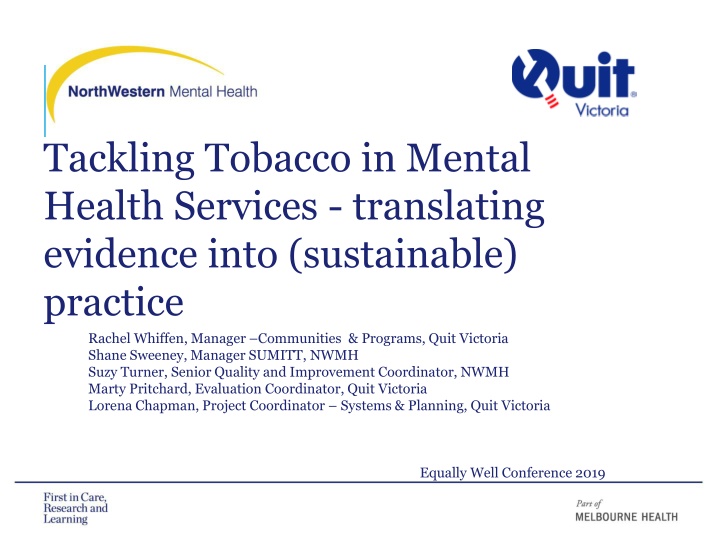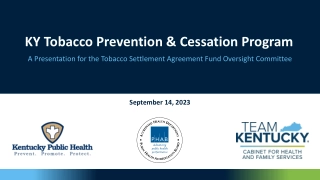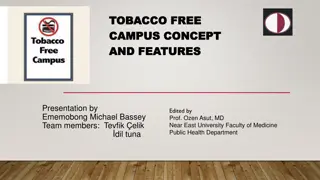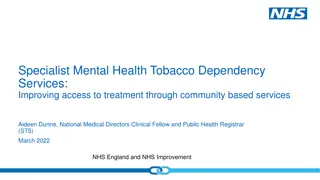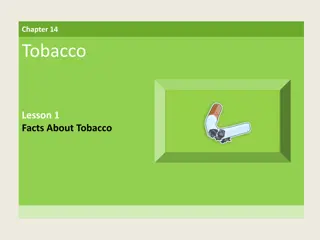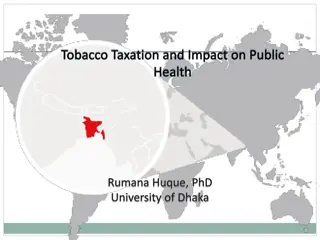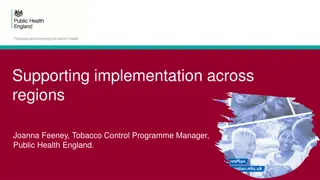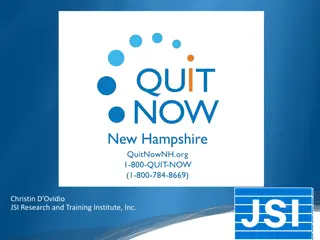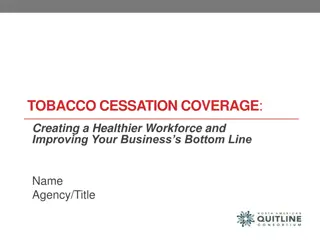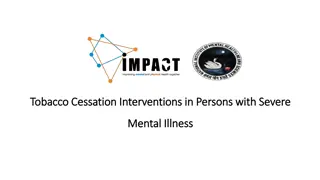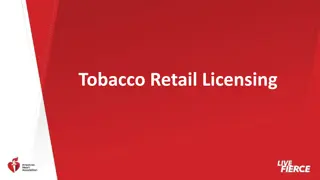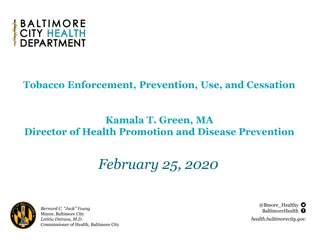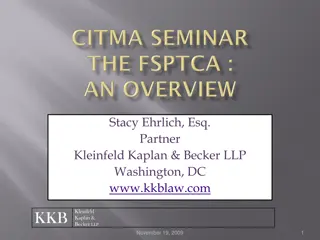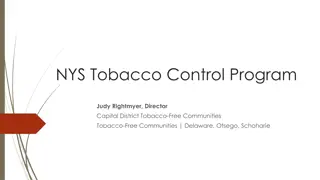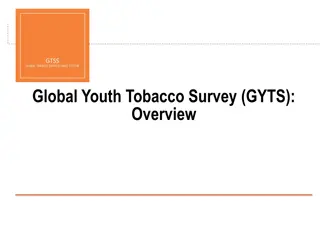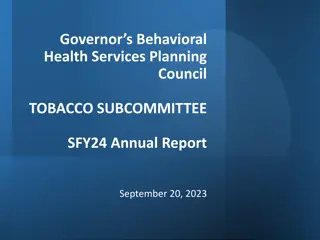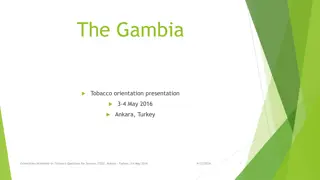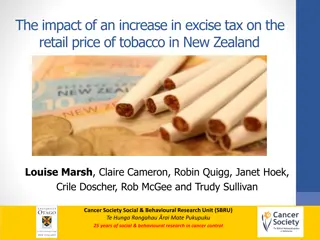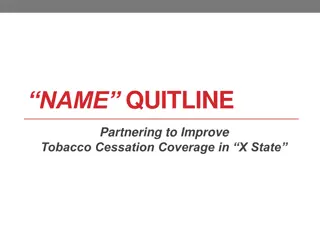Tackling Tobacco in Mental Health Services: Strategies and Partnerships
Learn how Northwestern Mental Health (NWMH) and Quit Victoria are collaborating to address tobacco use in mental health settings. With a focus on evidence-based practices, they aim to enhance smoking cessation support, create a tobacco-free environment, and empower staff and consumers. Through committed leadership and strategic partnerships, they are working towards sustainable change in this critical area.
Download Presentation

Please find below an Image/Link to download the presentation.
The content on the website is provided AS IS for your information and personal use only. It may not be sold, licensed, or shared on other websites without obtaining consent from the author.If you encounter any issues during the download, it is possible that the publisher has removed the file from their server.
You are allowed to download the files provided on this website for personal or commercial use, subject to the condition that they are used lawfully. All files are the property of their respective owners.
The content on the website is provided AS IS for your information and personal use only. It may not be sold, licensed, or shared on other websites without obtaining consent from the author.
E N D
Presentation Transcript
Tackling Tobacco in Mental Health Services - translating evidence into (sustainable) practice Rachel Whiffen, Manager Communities & Programs, Quit Victoria Shane Sweeney, Manager SUMITT, NWMH Suzy Turner, Senior Quality and Improvement Coordinator, NWMH Marty Pritchard, Evaluation Coordinator, Quit Victoria Lorena Chapman, Project Coordinator Systems & Planning, Quit Victoria Equally Well Conference 2019
NORTHWESTERN MENTAL HEALTH (NWMH) & QUIT VICTORIA NWMH Quit Victoria 32 sites across the northern and western suburbs of Melbourne ~1900 staff 532 youth, adult and aged mental health beds Catchment population 1.5 million 3 of the largest growth corridors in Australia High socio-economic disadvantage 30% CALD Principal agency for tobacco control in Victoria (30 years) Funding VicHealth, DHHS, CCV & Heart Foundation Prevent new nicotine addiction & help smokers become tobacco-free Create a tobacco-free environment Enhance and tailor efforts for priority populations Lead and facilitate Victoria s efforts to end the tobacco toll Quitline (134878) and Aboriginal Quitline
WHY NWMH AND QUIT PARTNERED TO TACKLE TOBACCO (THE EVIDENCE) Impact of tobacco on people living with a mental illness Research shows integration of smoking cessation support is effective Strategic priority for Quit, and a significant issue for NWMH 4 NWMH pilot sites: Orygen Youth Health (inpatient and community based) Adult Community Care Unit Adult Secure Extended Care Unit and Community based Team ~ 900 mental health consumers annually and 240 staff
TACKLING TOBACCO FRAMEWORK AND STRATEGIES Key Objectives: Increase knowledge, skills and confidence Increase access & use of supports Create a smoke free environment
COMMITTED LEADERSHIP Executive leadership: Formal endorsement from NWMH Executive Director and Director of Operations Quit Director works directly with NWMH Executive NWMH Director of Operations chairs NWMH Tackling Tobacco working group Local leadership: Each pilot site nominated leaders Local leaders engage with staff, consumers, carers and community to promote the importance of smoking cessation and what supports are available
SUPPORTIVE SYSTEMS New 0.6 EFT peer worker across pilot sites New NWMH screening & care pathway form Access to NRT
CONSISTENT QUIT SUPPORTS New smoking resources Quitline response enhanced
TRAINING AND EDUCATION 60-120 minute training module co-developed and delivered on site 250 staff trained Dispelling myths and perceived barriers, with evidence Smoking cessation brief advice (based on ask, advise, help model), behavioural interventions and NRT Full day deeper content workshops delivered to 55 champions and leaders across NWMH Access to online training modules- smoking and mental health
EVALUATION (MIDPOINT) Midpoint learnings based on analysis of 130 staff surveys, 180 training evaluation forms, key informant interviews, and 165 file audits indicate: Committed Leadership: Executive management endorsement - rated highly by staff as it - created the enabling environment for system and practice change. Lead worker at each of the sites has been central to maintaining drive and delivering strategies. Supportive Systems: Smokefree Form: Mixed results. A random audit of 165 files at NWMH and OYH revealed that 42% of the files had the form included; however, only 28% had been fully completed. Why? New forms in a busy mental health service is challenging. So? Sites are subsequently refining the form to enable higher compliance. But? The collection of consumer s smoking status has increased increased conversations
Supportive Systems continued: Peer Support Worker: is a key role to support consumers to quit. The leadership from peer support workers across the pilot sites has been significant. John, a mental health consumer, who lives with severe anxiety and depression, recently quit with support of the peer support worker. He had been wanting to quit smoking for a long time but had only been given general advice in the past such as just distract yourself or just go cold turkey . The peer support worker came out with a quit pack, recalls John. I had a browse through it and thought ok, this is how you do it. Access to Nicotine Replacement Therapy: Prescribing of pharmacotherapies to manage nicotine withdrawal has increased at inpatient settings, with one of sites dispensing almost doubling NRT prescriptions.
Training & Education: Staff knowledge and confidence in providing smoking cessation increased by 34% 60% of staff rate their service s capability to provide cessation support as extremely or very capable Staff at the sites are reporting culture change. The clients also suggested to have smokefree outings- sadly many of our clients are very fixated on smoking when they are out and about- so this is huge for them to initiate this. Team Leader. Staff are now actively supporting consumers to quit. In the 12 months prior, there had been no referrals to Quitline. As of June 2018, staff had completed 54 referrals for PLWMI. Consistent Quit Supports: A total of 23,000 hard copies of the ten new Tackling Tobacco resources have been disseminated.
SUSTAINABILITY NWMH: Service-wide roll out Improvements and changes to monitoring data and continuous improvement Dedicated NWMH Smoking cessation position Align with Physical Health portfolio Coordinate local champions and Peer Support Workers Incorporate into NWMH Orientation packages Ongoing communication strategy Quit: Quitline service Accessible training and education Dedicated resources on Quit website
Acknowledgements: NWMH Tackling Tobacco Steering Group members NWMH staff and consumers Quit Victoria staff Funded by VicHealth & DHHS Cancer Council NSW Questions???
